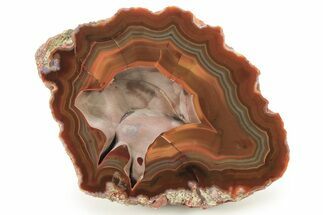This Specimen has been sold.
5.05" Polished Patagonia Crater Agate - Highly Fluorescent!
This is a stunning, 5.05" wide polished nodule of Crater agate from Argentina. It shows off the characteristic red-black coloration in the polished face surrounding a pocket of rust-red and white botryoidal chalcedony. It has been cut flat and polished to a glossy finish on one side with the rest of the nodule is left in rough form. The polished face of the agate fluoresces a phantasmal green color under short-wave UV light.
It comes with an acrylic display stand.
It comes with an acrylic display stand.
Crater agate, known by the locals as Orellanita, is categorized by its stunning red color which contrasts nicely against the hazy black chalcedony. They come from the Crater agate beds about 6 miles northwest of Las Plumas in the Chubut Province of Argentina. Crater agate forms as nodules that are found buried within the decomposed basaltic host rock. In rare cases, the botryoidal agate lined pockets can contain quartz and even amethyst. Often the agate exhibits a vivid green fluorescence that in some specimens is second to none.
Agate is a variety of microcrystalline quartz (chalcedony) that displays translucence and, in some cases, banding. Agate primarily forms when silica-rich fluids fill pockets within rocks and/or fossils, depositing the silica along the walls of the rock. This process can result in banding patterns, as the compositions and impurities of these depositing fluids change over time. These banding patterns can either form as flat layers, creating linear patterns known as waterline agate, or as rounded layers, forming more common ring-like patterns. These patterns depend on the surfaces available for deposition.
Agate is a variety of microcrystalline quartz (chalcedony) that displays translucence and, in some cases, banding. Agate primarily forms when silica-rich fluids fill pockets within rocks and/or fossils, depositing the silica along the walls of the rock. This process can result in banding patterns, as the compositions and impurities of these depositing fluids change over time. These banding patterns can either form as flat layers, creating linear patterns known as waterline agate, or as rounded layers, forming more common ring-like patterns. These patterns depend on the surfaces available for deposition.
SPECIES
Chalcedony var. Agate
LOCATION
Patagonia, Chubut Province, Argentina
SIZE
5.05 x 4.07", up to 1.6" thick
CATEGORY
SUB CATEGORY
ITEM
#206226
 Reviews
Reviews















